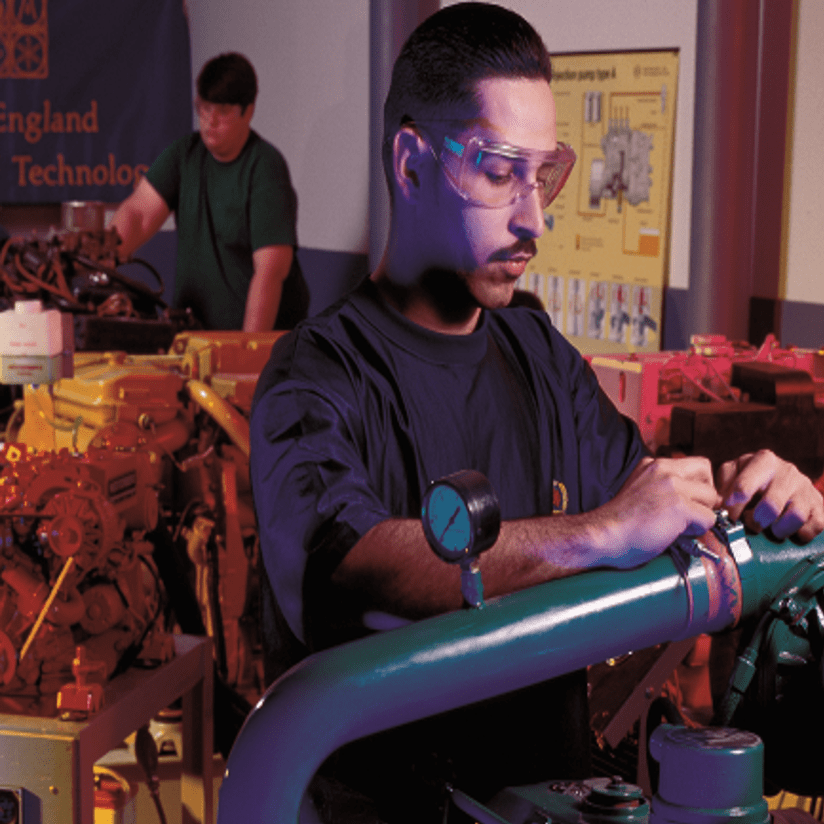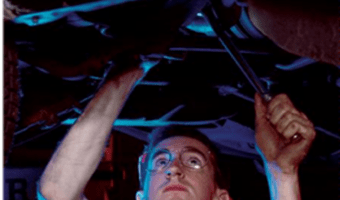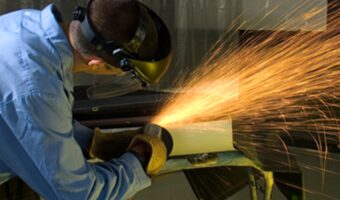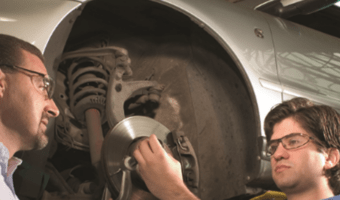Program Overview

In the Associate in Science degree program in Marine Technology, you will develop hands-on skills in the installation, service, and repair of mechanical, electrical, electronic, and hydraulic systems used by both recreational and commercial boats and ships. The Marine Technology program will give you the opportunity to achieve factory technician certification in repairing Volvo Penta and Yamaha propulsion systems. This will prepare you for entry-level positions in boatyard operations, boat and shop manufacturing, engine repair, marine electronics installation, and more. Upon graduation, students become members in the American Boating and Yacht Council (ABYC).
Read More The Marine Technology program offers an associate degree in Marine Technology and Advanced Marine Technology and a Certificate in Marine Technology. Theory and practical training in boat and ship mechanics, marine focused business concepts, marine electrical, and marine systems installation, repair and service are the thrust of the program. Hands-on practical skills in installation, service, and repairs to mechanical, electrical, electronic, and hydraulic systems utilized by both recreational and commercial boats and shops are stressed throughout the curriculum to reinforce the in-depth theory classes. In addition, marine business procedures are taught using computerized learning methods with marine-specific software. The Advanced Marine Technology degree program offers an additional term of study in some of the more advanced electronics and computer controls common in the industry today. Graduates of the associate degree program are skilled boat technicians ready for entry-level positions in such areas as marina/boatyard operations, boat and shop manufacturing, marine engine repair, support services for commercial boats and shops, engine room staff aboard commercial vessels, marine electronics installation, and marine wholesale/retail product sales. Graduates of this program are eligible to continue on for a Bachelor of Science Degree in Business Management to further their credentials. Faculty members in Marine Technology are factory-certified by ABYC, Volvo, and Mercury Marine. The Marine Technology Department is the New England training site for Volvo Penta Marine with advanced training available for qualified students. Students completing the Marine Technology program may also qualify to become certified Volvo Penta Technicians. ACCREDITATION STATUS NEIT’s Associate in Science in Marine Technology program is an ABYC (American Boat and Yacht Council) Marine League of Schools member. The Marine League of Schools is comprised of post-secondary schools offering marine trade programs that provide ABYC standards-based educational programming. The Marine Technology program is conditionally accredited by the Marine Trades Accreditation Program, ABYC Foundation, 613 Third Street, Annapolis, MD 21146, 410-990-4460, ext. 200, [email protected].Full Description
Potential Career Opportunities
The marine mechanic training will provide both the knowledge and skill needed to repair, maintain, and rebuild electrical systems, boat engines, motors, and other marine instruments.
Graduates of marine mechanic schools will find plenty of job openings in repair shops, though they may also find work on docks and marinas performing on-site overhauls for larger crafts like commercial fishing boats or private vessels.
The hands-on-experience provided by NEIT will also qualify individuals for careers in specialty positions across the boating and marine industry. Upon graduation, attainable marine service titles may include:
Marine Technician
Marine Systems Installer
Engine Builder
Franchise Dealership
Technician
FAQ
-
How long is a marine mechanic school?
The associate program in Marine Technology will take 18 months to complete. In addition to the hands-on-training provided at NEIT, graduates may be required to acquire additional certifications before they can begin work in the field.
The American Boat and Yacht Council (ABYC) is a recognized authority in the industry and offers certificate programs including specialty certification classes. Individuals must pass three out of the eight offered to become Master Marine Technicians.
-
How do you become a certified marine mechanic?
Becoming a certified marine mechanic involves a few different steps. First, students must pursue an associate degree or equivalent. There, they will gain the skills needed to perform entry-level work. One to two years of on-the-job experience is recommended before pursuing certification.
After that window, individuals are encouraged to browse the programs offered by the ABYC. The organization offers certifications in subjects such as AC/Refrigeration, Diesel Engines, and Advanced Marine Electrical.
Certifications are valid for five years. After that, individuals must pass a recertification exam to maintain their status.
-
Is a Marine Mechanic a good career?
Job prospects for marine mechanics remain promising. According to the Bureau of Labor Statistics, motor vehicle dealers remain the number one source of employment for motorboat mechanics and marine service technicians. These positions may require specific training related to their product lines. The boat building and repair and maintenance industries are also major employers of individuals involved in the marine trades.




